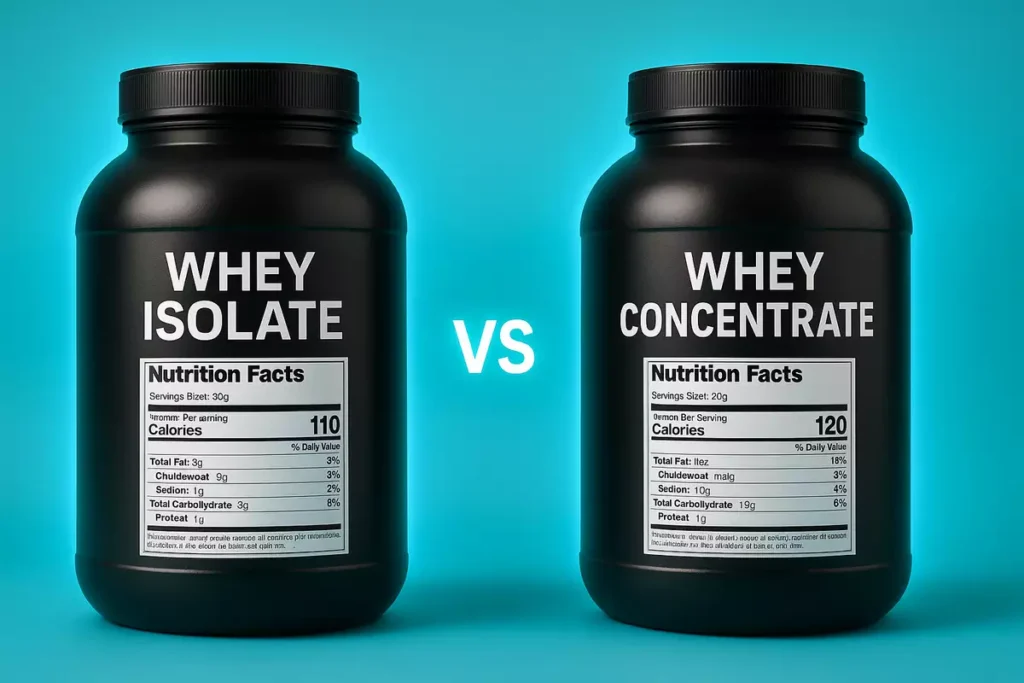Wondering if whey protein breaks your fast? You’re not alone.
Intermittent fasting is one of the most effective tools for fat loss, but combining it with muscle-building nutrition like whey protein can get confusing fast.
As a coach who’s tested this firsthand and guided dozens of clients through it, I can tell you this: whey can absolutely fit into your IF plan—if you know when and how to use it.
Let’s break it down so you don’t waste your gains or stall your results.
Table of contents
- What Breaks a Fast?
- When to Take Whey Protein During Intermittent Fasting
- Who Should Use Whey Protein During Fasting?
- Best Types of Whey for Intermittent Fasting
- How Whey Supports Intermittent Fasting Goals
- Common Mistakes to Avoid
- Final Verdict – Should You Use Whey While Fasting?
- Bonus: What I Tell My Clients
What Breaks a Fast?
Let’s clear this up first: any source of calories breaks a fast, including whey protein.
Whether it’s whey concentrate or isolate, protein powder contains calories and triggers an insulin response—which means your body switches from a fasted to a fed state.
So if your goal is to stay in a fasted state, don’t take whey during the fasting window.
However, that doesn’t mean whey has no place in your IF routine. It just needs to be used at the right time—usually right after breaking your fast.
When to Take Whey Protein During Intermittent Fasting

From my own experience, the best time to take whey protein during IF is as your first meal—or immediately post-workout if you train in the morning.
I used to fast until around 11 a.m., then break my fast with a whey isolate shake right after my 10 a.m. workouts.
This combo gave me fast-digesting protein right when my body needed it most, followed by a balanced whole-food meal 30–60 minutes later.
I’ve also coached people like Alex from the UK, who trained at noon during his 16:8 fasting window.
When he added a whey shake post-workout (his first meal of the day), he saw faster recovery and better muscle definition—especially in his arms.
For more info on when to take whey, check out this complete timing guide.
Who Should Use Whey Protein During Fasting?
Whey protein is a lifesaver for anyone trying to build or maintain muscle while fasting, especially if you struggle to hit your daily protein target.
It’s especially useful for:
- People who work out fasted in the morning
- Those with low appetite in early meals
- Busy professionals who need a quick, clean protein source
For example, Ravi from India was doing 18:6 IF but wasn’t seeing results. He was unknowingly taking whey during his fasting window.
Once we adjusted his timing—post-fast and post-workout—his weight started dropping again and his energy improved.
If you’re a female lifter, check out this guide on whey protein for women.
Best Types of Whey for Intermittent Fasting

I’ve used both whey concentrate and isolate during fasting phases. Whey isolate is hands down the better choice if you’re combining it with IF.
Why? Because it:
- Has lower carbs and fats
- Is easier to digest
- Minimizes bloating or GI issues
During one of my cutting cycles, I used concentrate for a week and felt heavy, sluggish, and bloated.
Switching to isolate made a night-and-day difference—I had more energy, better digestion, and less hunger rebound.
Looking for cleaner options? Here’s a list of lactose-free whey protein powders ideal for sensitive stomachs.
How Whey Supports Intermittent Fasting Goals
✅ Used correctly, whey protein enhances your IF results in several ways:
- Preserves muscle during calorie restriction
- Speeds up recovery after training
- Helps hit protein targets when appetite is low
- Curbs cravings in the first half of the eating window
- Supports metabolism and thermogenesis
Personally, I found whey to be my go-to tool for staying anabolic while staying lean.
It helped me hold on to muscle mass even when I was in a 20–25% calorie deficit during cuts.
Whey also complements other powerful supplements. If you’re stacking for better results, check out this guide on whey and creatine.
Common Mistakes to Avoid

❌ Here’s what I’ve seen many people get wrong:
- Taking whey during the fasting window – It spikes insulin and breaks the fast.
- Over-relying on shakes – Whey is a supplement, not a meal replacement.
- Using low-quality powders – Cheap blends often contain hidden carbs and poor-quality ingredients.
If you’re trying to replace meals with shakes, read this detailed meal replacement guide first.
Also, if you’re bulking or unsure whether to go with whey or a mass gainer, this breakdown may help:
👉 Mass Gainer vs Whey Protein Shake
Final Verdict – Should You Use Whey While Fasting?
Absolutely—if used smartly.
If you train during your fasting window, a whey shake post-workout is one of the most effective ways to kick off your eating window.
It helps preserve lean muscle, support recovery, and give your metabolism a solid boost.
Whey isn’t magic. But when paired with smart intermittent fasting, it becomes a powerful tool—one that’s helped me and many clients stay lean, strong, and consistent.
You can even use whey for strategic fat-burning support—here’s how:
👉 Whey Protein for Fat Loss
Bonus: What I Tell My Clients
When a new client starts IF, I always ask:
How many grams of protein do you eat daily?
If they struggle to get enough, I recommend adding one clean whey isolate shake daily—post-fast or post-workout.
It’s simple, effective, and works.
Whether you’re just starting IF or fine-tuning your fat loss plan, whey can be your best ally—just time it right.



Leave a Reply